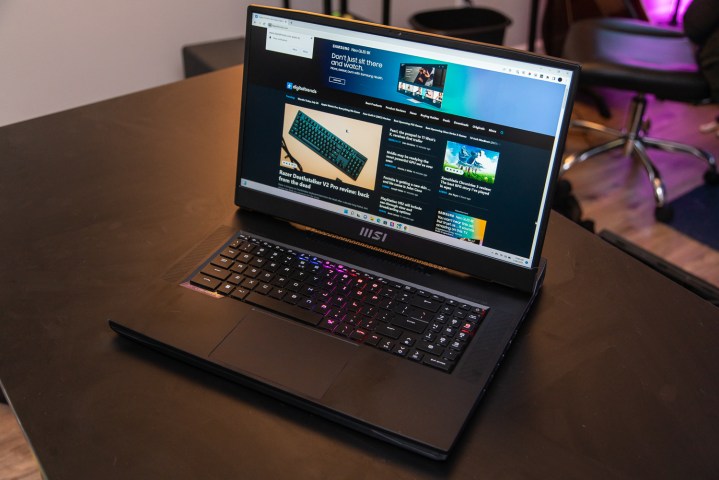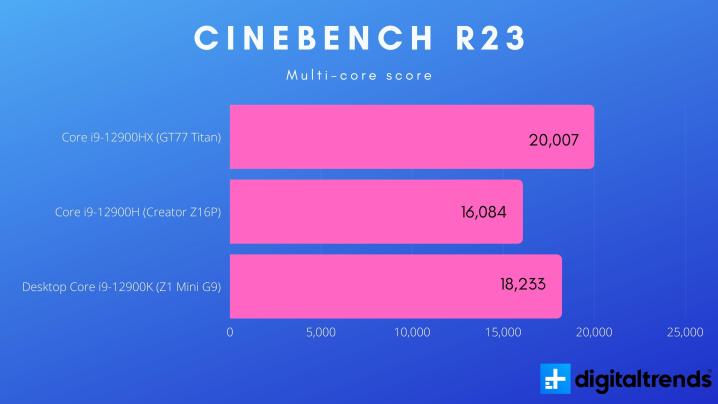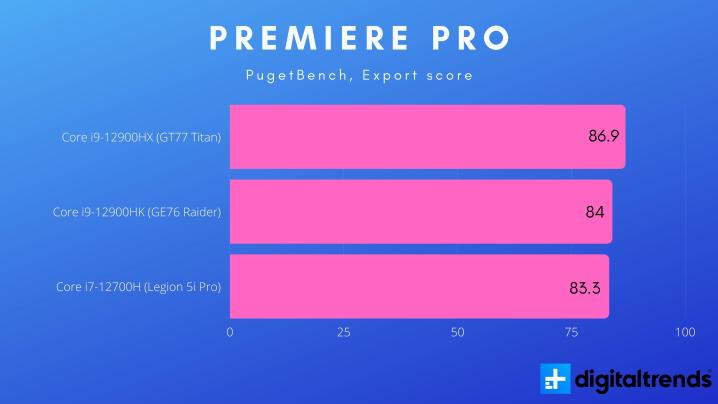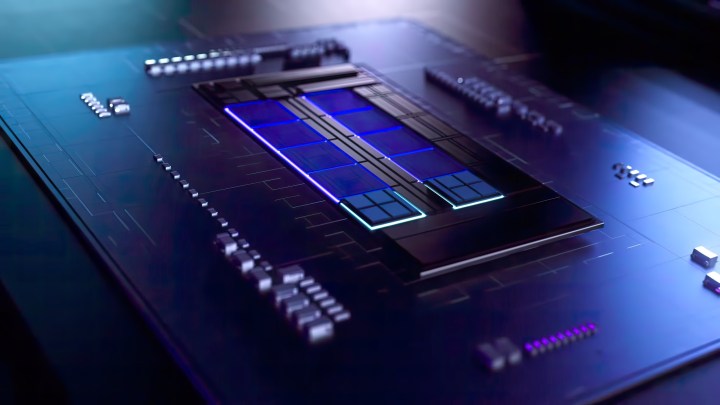When I reviewed the MSI GT77 Titan, one thing was clear: Intel’s new 16-core Core i9-12900HX is a monster. It beat everything, delivering the best raw processor performance you can buy right now regardless of heat, power, or noise. It worked, but a closer look at the thermal situation reveals how little room Intel has left to grow.
The GT77 Titan is the best case gaming laptop for the Core i9-12900HX with a massive cooling apparatus on the back that ramps up like a jet engine when the CPU is under load. Even still, this $5,000+ laptop with a cooler almost exclusively designed to handle a 16-core, 55W laptop processor shows thermal throttling immediately in CPU-intensive applications. Unless Intel gets the power and thermal situation under control, it’s hard to expect high-end 13th-gen Raptor Lake chips to deliver in the same way 12th-gen Alder Lake processors have.
Throttling doesn’t matter when you’re the best

I reran a bunch of tests on the Core i9-12900HX to see if 16 cores really mattered, fully expecting to find thermal throttling left and right. And that’s exactly what I found. Thermal throttling doesn’t really matter if it’s not limiting your performance, though, and in the case of the Core i9-12900HX, it tops the charts.
Thermal throttling is what happens when your CPU reaches its maximum temperature. To keep the processor safe and operational, it will automatically reduce its speed until a safe temperature has been reached. This has been an ongoing issue with Intel’s mobile processors, and it was a big driving force behind Apple ditching Intel for its own silicon.
The Core i9-12900HX thermal throttles, but it still manages the best performance out of any laptop processor you can buy right now. In PassMark, for example, it’s as much as 27% faster than the Core i9-129000HK, and as much as 50% faster than AMD’s flagship Ryzen 9 6900HX. That’s despite the fact that the Core i9-12900HX throttled when it reached 95 degrees Celsius and downclocked as low as 1.4GHz for a brief moment.
A more intense benchmark like Cinebench tells the same story. The multi-core score of Core i9-12900HX is 33% higher than the Core i9-12900H, and nearly identical to the desktop Core i9-12900K inside the small form factor HP Z1 Mini G9. And in this benchmark, the Core i9-12900HX was thermally limited the entire time, never going above about 3.3GHz.

Cinebench and Passmark are synthetic benchmarks — they measure theoretical performance, which doesn’t always translate into the real world. For that, I used the video encoding app Handbrake. The Core i9-12900HX stayed throttled throughout the test as it did in Cinebench, reaching as high as 98 degrees Celsius and hovering between 2.7GHz and 3.5GHz.
But once again, the 16-core monster showed its power, being 20% faster than the Core i9-12900HK inside the MSI GE76 Raider and 43% faster than the M1 Pro (though, admittedly inside the thermally-constrained MacBook Pro 14).
Intel is laughing in the face of thermal throttling with the Core i9-12900HX. It may never reach the advertised 5GHz when all the cores are running, but it doesn’t matter; when you’re focused on the CPU, the Core i9-12900HX decimates everything. The gains aren’t always as stark, though, and in some cases, thermal throttling laughs back.
Going beyond processor power
Taking the Core i9-12900HX out into the real world, the performance boost isn’t as drastic. In PugetBench for Premiere Pro, the Core i9-12900HX is a mere 4% faster in export performance than the Core i7-12700H inside the Lenovo Legion 5i Pro. It’s an advantage, but not much of one considering the Lenovo laptop is $2,400 while the GT77 Titan with the Core i9-12900HX is $5,000.

In gaming, this is even more important. You don’t need 16 cores for gaming, sure, but the thermal constraints the Core i9-12900HX imposes mean you can actually see lower performance. In the CPU-limited Assassin’s Creed Valhalla, for example, the Core i9-12900HX was 8% slower than the Core i9-12900HK inside the GE76 Raider at 1080p. And the GE76 Raider is identical in the configuration and even has a smaller cooling solution than the GT77 Titan and its Core i9-12900HX.
Similarly, the Core i9-12900HX only produced a 5% improvement compared to the Core i7-12800H inside the Razer Blade 17, and was around 4% slower than the Core i7-12700H in the Lenovo Legion 5i Pro (even when the Lenovo machine has the weaker RTX 3070 Ti mobile GPU).
There’s no doubt that the Core i9-12900HX is a niche product, but it’s hard to justify even for the most staunch enthusiasts and professionals outside of raw CPU benchmarks. The thermal constraints mean that the cheaper Core i7-12700HX is almost identical across the board, with the same number of cores but a more sensible clock speed (and power demands).
What this means for Raptor Lake

As it stands, Intel is back on top in raw performance, showcasing what throwing more cores and power at the performance problem can do. But it’s clear we’re reaching the upper limit of what its Intel 7 process can do, though. The Core i9-12900HX throttles almost immediately in any CPU-intensive task, and that doesn’t bode well for next-gen Raptor Lake processors.
We already know that Raptor Lake processors will use the same Intel 7 process, and a number of leaks have pointed to Intel refreshing the performance cores of Alder Lake while keeping the same efficiency cores. In short, Raptor Lake looks like a refresh to 12th-gen Alder Lake at this point while we wait for Intel 4 to arrive on Meteor Lake.
Instead of a new process, rumors show that Intel is focusing on core speed — and it’s working. Recently leaked benchmarks show as much as a 60% improvement over some 12th-gen processors (and that’s with the chips running below rumored speeds). We’ve only seen leaked desktop benchmarks, though, and laptops are a completely different game.
Sure, the desktop Core i9-12900K hits its thermal limit quickly and draws obscene power, but who cares? Throw an all-in-one liquid cooler in your PC and a couple of case fans. On mobile, the thermal limit is all that matters. If we’re seeing this amount of throttling now, it’s hard to expect much from Raptor Lake when it uses the same process and is rumored to largely be a refresh of Alder Lake.
We should have a clearer view soon, though. Raptor Lake is rumored to launch this year, and Intel has one of its Innovation events scheduled for September 27 where we expect to hear more about 13th-gen (and maybe even a peek at mobile).
Editors’ Recommendations




